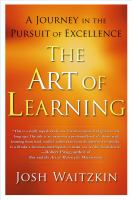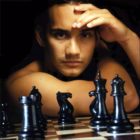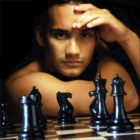Tips From The Art of Learning
Waitzkin spends a lot of time telling stories about his experiences that illustrate how he came to learn these principles. These are great stories, however, I would like to focus on the principles he gleans from them. I definitely suggest reading his book to gain more insight into these concepts and how he came to learn them.
 The Art of Learning - Basic Principles
The Art of Learning - Basic Principles
See learning as incremental not as something that comes from an inherent amount of skill or talent. Realizing that hard work and effort is what leads to learning helps us press on when we fail, instead of taking it personally. Thinking "I can keep working at this and get better" instead of "I'm just no good at this, I have no inherent skill or talent" is one of the fundamentals of learning.
Another basic principle is one that Waitzkin calls "numbers to leave numbers." It involves analyzing and studying patterns, techniques or variations to the point that your mind can subconsciously or intuitively solve or perform complex analysis. Many of us have practiced a physical skill - like a dance move - and after much repetition it become a part of your muscle memory so you no longer have to think about performing the steps. Waitzkin did the same thing with his mind and analyzing complex chess moves. Even complex routines can be broken down into small steps and practiced slowly until over time the movement is mastered and can be performed quickly. The brain can also be trained to process large amounts of information quickly using similar techniques.
From sports psychology, Waitzkin learned the importance of entering "The Soft Zone." This is a place where your state of concentration is not dependent on your environment. Distractions like a screaming baby or a demanding phone call do not disrupt your relaxed state. You have learned to flow with whatever comes and even "integrate every ripple of life into your creative moment."
Waitzkin gives details on a technique he's learned to stay "in the zone." First identify an activity where you naturally feel in the zone - you're relaxed, things just flow and you have a serene focus. Then create a routine you will do just before learning - such as eating a particular snack, doing a meditative activity and/or listening to a particular song. The idea is to associate your routine with the feeling of being in the zone. After some time, perform the routine just before going into a high stress situation and it should help you enter that place of serene focus.
Another strategy Waitzkin learned from sports psychology is the concept of "stress and recovery." Take a brief moment to allow your mind and/or body to be inactive, then when you get back into the game (or into learning) you'll be sharper and even more focused. What is really fascinating is that the psychologists Waitzkin was working with discovered that physical interval training in which the body is exercised at a high resistance level and then given a minute of taking it easy before revving the intensity up again seems to train the mind to also quickly release tension and recover from mental exhaustion.
"In virtually every discipline, one of the most telling features of a dominant performer is the routine use of recovery periods," said Waitzkin.
Waitzkin also talks about the importance of keeping "a beginner's mind" and being willing to make an "investment in loss." Even after you have mastery in a particular field, don't consider yourself an expert. Good learners keep thinking of themselves as beginners who need to keep learning - and even failing as they learn - to keep improving. Waitzkin would intentionally spar with competitors he knew would have a good chance of beating him for this reason.
These are great principles for adult learners seeking to improve their skills, learn new mental or physical techniques, and gain confidence. I am most intrigued by the concept of stress and recovery and how interval training for the body can also affect the mind.
Which of these concepts most intrigues you? I'd love to hear your thoughts in the comments and be sure to check out The Art of Learning by Josh Waitzkin (who, incidentally is the subject of the book and film Searching for Bobby Fischer) if you'd like to learn more. You can also explore his Art of Learning Project website to explore these concepts online.
Happy Learning!











